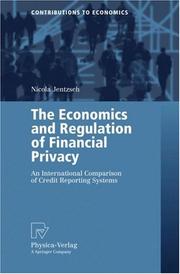| Listing 1 - 10 of 11 | << page >> |
Sort by
|

ISBN: 0262279827 0585448418 9780262279826 9780585448411 0262134225 Year: 2003 Publisher: Cambridge, Mass. MIT Press
Abstract | Keywords | Export | Availability | Bookmark
 Loading...
Loading...Choose an application
- Reference Manager
- EndNote
- RefWorks (Direct export to RefWorks)
"Credit reporting is a critical part of the financial system in most developed economies but is often weak or absent in developing countries. It addresses a fundamental problem of credit markets: asymmetric information between borrowers and lenders that can lead to adverse selection and moral hazard. The heart of a credit report is the record it provides of an individual's or a firm's payment history, which enables lenders to evaluate credit risk more accurately and lower loan processing time and costs. Credit reports also strengthen borrower discipline, since nonpayment with one institution results in sanctions with others." "This book provides the first comprehensive review of credit reporting systems worldwide and documents the rapid growth in the industry. It offers empirical and theoretical evidence of the impact of credit reporting on financial markets, using examples from both developed and developing economies. Credit reporting, it shows, significantly contributes to predicting default risk of potential borrowers, which promotes increased lending activity. The book also covers the role of public policy in the development of credit reporting initiatives, including the role of public credit registries managed by central banks; and the role of legal, regulatory, and institutional factors in supporting credit reporting."--Jacket.
Credit bureaus --- Consumer credit --- Credit --- Credit information services --- Credit reporting agencies --- Mercantile agencies --- Consumer debt --- Information services
Book
ISBN: 1606921924 161728212X 9781617282126 9781606921920 Year: 2009 Publisher: New York : Nova Science Publishers,
Abstract | Keywords | Export | Availability | Bookmark
 Loading...
Loading...Choose an application
- Reference Manager
- EndNote
- RefWorks (Direct export to RefWorks)
Credit bureaus. --- Credit ratings. --- Credit bureaus --- Credit ratings --- Finance --- Credit, Debt & Loans --- Business & Economics --- Commercial ratings --- Credit checks --- Credit guides --- Credit investigations --- Credit reports --- Ratings, Credit --- Credit --- Credit information services --- Credit reporting agencies --- Mercantile agencies --- Information services

ISBN: 9780470018002 Year: 2008 Publisher: Hoboken, NJ : Wiley,
Abstract | Keywords | Export | Availability | Bookmark
 Loading...
Loading...Choose an application
- Reference Manager
- EndNote
- RefWorks (Direct export to RefWorks)
Private finance --- Credit ratings. --- Credit bureaus. --- Credit bureaus --- Credit ratings --- 336.774.3 --- 332.7 --- Kredietbeoordeling. Kredietcontrole. Kredietkwaliteit. Kredietwaardering --- 336.774.3 Kredietbeoordeling. Kredietcontrole. Kredietkwaliteit. Kredietwaardering --- Commercial ratings --- Credit checks --- Credit guides --- Credit investigations --- Credit reports --- Ratings, Credit --- Credit --- Credit information services --- Credit reporting agencies --- Mercantile agencies --- Information services --- Notation financière
Book
ISBN: 012404736X 0124045693 1306070686 9780124047365 9780124045699 Year: 2014 Publisher: Oxford : Academic Press, an imprint of Elsevier,
Abstract | Keywords | Export | Availability | Bookmark
 Loading...
Loading...Choose an application
- Reference Manager
- EndNote
- RefWorks (Direct export to RefWorks)
The Independence of Credit Rating Agencies focuses on the institutional and regulatory dynamics of these agencies, asking whether their business models give them enough independence to make viable judgments without risking their own profitability. Few have closely examined the analytical methods of credit rating agencies, even though their decisions can move markets, open or close the doors to capital, and bring down governments. The 2008 financial crisis highlighted their importance and their shortcomings, especially when they misjudged the structured financial products that
Rating agencies (Finance) --- Credit ratings. --- Credit bureaus. --- Credit --- Credit information services --- Credit reporting agencies --- Mercantile agencies --- Commercial ratings --- Credit checks --- Credit guides --- Credit investigations --- Credit reports --- Ratings, Credit --- Agencies, Rating (Finance) --- Rating services (Finance) --- Financial services industry --- Information services --- AA / International- internationaal --- 333.663 --- 336.312.3 --- rating van bedrijven --- Solvabiliteit, kredietwaardigheid van de landen. Risicolanden

ISBN: 0262134225 Year: 2003 Publisher: Cambridge MIT
Abstract | Keywords | Export | Availability | Bookmark
 Loading...
Loading...Choose an application
- Reference Manager
- EndNote
- RefWorks (Direct export to RefWorks)
"Credit reporting is a critical part of the financial system in most developed economies but is often weak or absent in developing countries. It addresses a fundamental problem of credit markets: asymmetric information between borrowers and lenders that can lead to adverse selection and moral hazard. The heart of a credit report is the record it provides of an individual's or a firm's payment history, which enables lenders to evaluate credit risk more accurately and lower loan processing time and costs. Credit reports also strengthen borrower discipline, since nonpayment with one institution results in sanctions with others." "This book provides the first comprehensive review of credit reporting systems worldwide and documents the rapid growth in the industry. It offers empirical and theoretical evidence of the impact of credit reporting on financial markets, using examples from both developed and developing economies. Credit reporting, it shows, significantly contributes to predicting default risk of potential borrowers, which promotes increased lending activity. The book also covers the role of public policy in the development of credit reporting initiatives, including the role of public credit registries managed by central banks; and the role of legal, regulatory, and institutional factors in supporting credit reporting."--Jacket.
AA / International- internationaal --- 333.78 --- 658.42 --- 333.109 --- Credit bureaus --- -Consumer credit --- -Credit bureaus --- -332.3 --- Credit --- Credit information services --- Credit reporting agencies --- Mercantile agencies --- Consumer debt --- Kredietcontrole. Credit crunch. --- Financiële controle van de ondernemingen. Bedrijfsrevisoren. Belastingsconsulenten. Consulenten. --- Veiligheid. Bankovervallen. Bankrisico's. --- Information services --- Private finance --- Consumer credit --- 332.3 --- Veiligheid. Bankovervallen. Bankrisico's --- Kredietcontrole. Credit crunch --- Financiële controle van de ondernemingen. Bedrijfsrevisoren. Belastingsconsulenten. Consulenten
Book
ISBN: 3030716937 3030716929 Year: 2021 Publisher: Cham : Springer International Publishing : Imprint: Palgrave Macmillan,
Abstract | Keywords | Export | Availability | Bookmark
 Loading...
Loading...Choose an application
- Reference Manager
- EndNote
- RefWorks (Direct export to RefWorks)
This book details the difference between the two rating industries, but this difference is converging all the time. The concept of investing in a more responsible and sustainable manner is drawing in some of the world’s leading investors and, with it, regulations and policies are developing at the highest levels. However, the market is not getting what it needs to fully submit to the concept of responsible investing. It has called for more to be done from those tasked with injecting information into their processes, and two industries in particular have been identified as being natural partners. It has been suggested that they are on a collision course to serve the mainstream investor, and in this book, that collision course is contextualised, explained, presented, and finally its outcome predicted. Daniel Cash is Lecturer at Aston University. He has published exclusively on the credit rating sector and has authored a number of books, edited collections, and articles on the subject.
Rating agencies (Finance) --- Credit bureaus. --- Finance --- Environmental aspects. --- Funding --- Funds --- Economics --- Currency question --- Credit --- Credit information services --- Credit reporting agencies --- Mercantile agencies --- Agencies, Rating (Finance) --- Rating services (Finance) --- Financial services industry --- Information services --- Financial services industry. --- Economic development. --- Financial Services. --- Economic Development, Innovation and Growth. --- Development, Economic --- Economic growth --- Growth, Economic --- Economic policy --- Statics and dynamics (Social sciences) --- Development economics --- Resource curse --- Services, Financial --- Service industries
Book
ISBN: 0471887250 Year: 1983 Publisher: New York Chichester Brisbane Wiley
Abstract | Keywords | Export | Availability | Bookmark
 Loading...
Loading...Choose an application
- Reference Manager
- EndNote
- RefWorks (Direct export to RefWorks)
Financial management --- AA / International- internationaal --- 657.5 --- 658.45 --- 333.70 --- 333.109 --- 339.4 --- Accountantscontrole. Administratiekantoren. Interne audit. Financiële ratios en analyse. --- Reserves van vennootschappen. Dividenden. Zelffinanciering. Cash flow. --- Theorie en organisatie van het bankkrediet. --- Veiligheid. Bankovervallen. Bankrisico's. --- Vermogensbeheer. Financiële analyse. Verspreiding van de beleggingsrisico's. --- Bank loans --- Credit bureaus --- Credit --- Borrowing --- Finance --- Money --- Loans --- Credit information services --- Credit reporting agencies --- Mercantile agencies --- Bank credit --- Handbooks, manuals, etc --- Veiligheid. Bankovervallen. Bankrisico's --- Theorie en organisatie van het bankkrediet --- Vermogensbeheer. Financiële analyse. Verspreiding van de beleggingsrisico's --- Accountantscontrole. Administratiekantoren. Interne audit. Financiële ratios en analyse --- Reserves van vennootschappen. Dividenden. Zelffinanciering. Cash flow --- Information services

ISSN: 14311933 ISBN: 1280635509 9786610635504 3790817384 3790817376 9783790817379 Year: 2006 Publisher: Heidelberg : Physica-Verlag HD : Imprint: Physica,
Abstract | Keywords | Export | Availability | Bookmark
 Loading...
Loading...Choose an application
- Reference Manager
- EndNote
- RefWorks (Direct export to RefWorks)
This book provides the first in-depth analysis of the economics and regulation of financial privacy. It is an international comparison of credit reporting systems in the United States and in European countries. On the theoretical level the book explains competition in information markets, especially in markets for goods made of highly personal and sensitive information. It reviews the microeconomics of information and privacy and discusses the economic incentives to disclose or to conceal information. The book also focuses on the institutions of credit reporting, the history of credit reporting agencies and the regulation of privacy and credit reporting on both sides of the Atlantic as well as internationally. Finally, on the empirical level, it reviews the microeconomic and potential macroeconomic effects of credit reporting in the credit markets of countries around the world.
Credit bureaus. --- Credit ratings. --- Commercial ratings --- Credit checks --- Credit guides --- Credit investigations --- Credit reports --- Ratings, Credit --- Credit --- Credit information services --- Credit reporting agencies --- Mercantile agencies --- Information services --- Human rights --- Private finance --- International finance --- Financial law --- European Union --- United States --- Economic policy. --- Macroeconomics. --- Law and economics. --- Public finance. --- Economic Policy. --- Macroeconomics/Monetary Economics//Financial Economics. --- Law and Economics. --- Financial Law/Fiscal Law. --- Cameralistics --- Public finance --- Currency question --- Economics and jurisprudence --- Economics and law --- Jurisprudence and economics --- Economics --- Jurisprudence --- Economic nationalism --- Economic planning --- National planning --- State planning --- Planning --- National security --- Social policy --- Public finances --- United States of America
Book
ISBN: 9783319179278 3319179268 9783319179261 3319179276 Year: 2015 Publisher: Cham : Springer International Publishing : Imprint: Springer,
Abstract | Keywords | Export | Availability | Bookmark
 Loading...
Loading...Choose an application
- Reference Manager
- EndNote
- RefWorks (Direct export to RefWorks)
The book examines the role of credit rating agencies (CRAs) in the subprime mortgage crisis. The CRAs are blamed for awarding risky securities ‘3-A’ investment grade status and then failing to downgrade them quickly enough when circumstances changed, which led to investors suffering substantial losses. The causes identified by the regulators for the gatekeeper failure were conflicts of interest (as the issuers of these securities pay for the ratings); lack of competition (as the Big Three CRAs have dominated the market share); and lack of regulation for CRAs. The book examines how the regulators, both in the US and EU, have sought to address these problems by introducing soft law self-regulation in accordance with the International Organisation of Securities Commissions Code and hard law statutory regulation, such as that found in the “Reform Act” and “Dodd-Frank Act” in the US and similar provisions in the EU. The highly topical book examines these provisions in detail by using a doctrinal black-letter law method to assess the success of the regulators in redressing the problems identified. It also examines the US case law regulation relating to the legal liability of CRAs. The book examines whether the regulations introduced have had a deterrent effect on the actions of CRAs, whether investors are compensated for their losses, and how the regulators have dealt with the issues of conflicts of interest and an anti-competitive environment. Should liability be introduced for CRAs through changes in the law so as to compel them to issue reliable ratings and solve the current problems? The book seeks to simplify the complex issues involved and is backed by concrete evidence; as such, it will appeal to both the well-informed and the lay general public who are interested in learning more about the role of CRAs in the sub-prime mortgage crisis and regulators’ attempts to remedy the situation. Novice readers can familiarise themselves with the legal and financial terminology used by referring to the glossary at the end of the book.
Law. --- International Economic Law, Trade Law. --- Financial Economics. --- Private International Law, International & Foreign Law, Comparative Law. --- European Law. --- Finance. --- Droit --- Finances --- Law, Politics & Government --- Law, General & Comparative --- Credit bureaus --- Credit --- Credit information services --- Credit reporting agencies --- Mercantile agencies --- Information services --- Private international law. --- Conflict of laws. --- International law. --- Comparative law. --- Trade. --- Macroeconomics. --- Macroeconomics/Monetary Economics//Financial Economics. --- Private International Law, International & Foreign Law, Comparative Law . --- Economics --- Law—Europe. --- Choice of law --- Conflict of laws --- Intermunicipal law --- International law, Private --- International private law --- Private international law --- Law --- Legal polycentricity --- Law of nations --- Nations, Law of --- Public international law --- Civil law
Book
ISBN: 9781475546132 1475546130 147551459X 9781475514599 147556323X 1299395414 Year: 2013 Publisher: Washington, D.C. : International Monetary Fund,
Abstract | Keywords | Export | Availability | Bookmark
 Loading...
Loading...Choose an application
- Reference Manager
- EndNote
- RefWorks (Direct export to RefWorks)
Credit rating agencies face a difficult trade-off between delivering both accurate and stable ratings. In particular, its users have consistently expressed a preference for rating stability, driven by the transactions costs induced by trading when ratings change frequently. Rating agencies generally assign ratings on a through-the-cycle basis whereas banks' internal valuations are often based on a point-in-time performance, that is they are related to the current value of the rated entity's or instrument's underlying assets. This paper compares the two approaches and assesses their impact on rating stability and accuracy. We find that while through-the-cycle ratings are initially more stable, they are prone to rating cliff effects and also suffer from inferior performance in predicting future defaults. This is because they are typically smooth and delay rating changes. Using a through-the-crisis methodology that uses a more stringent stress test goes halfway toward mitigating cliff effects, but is still prone to discretionary rating change delays.
Credit ratings --- Credit bureaus --- Credit --- Credit information services --- Credit reporting agencies --- Mercantile agencies --- Commercial ratings --- Credit checks --- Credit guides --- Credit investigations --- Credit reports --- Ratings, Credit --- Evaluation --- Information services --- E-books --- Credit bureaus. --- Evaluation. --- Banks and Banking --- Exports and Imports --- Financial Risk Management --- Money and Monetary Policy --- Personal Finance -Taxation --- Financial Institutions and Services: General --- Investment Banking --- Venture Capital --- Brokerage --- Ratings and Ratings Agencies --- Financial Institutions and Services: Government Policy and Regulation --- Personal Income and Other Nonbusiness Taxes and Subsidies --- Monetary Policy, Central Banking, and the Supply of Money and Credit: General --- International Financial Markets --- International Lending and Debt Problems --- Financing Policy --- Financial Risk and Risk Management --- Capital and Ownership Structure --- Value of Firms --- Goodwill --- Public finance & taxation --- Monetary economics --- Finance --- International economics --- Financial services law & regulation --- Personal income tax --- Asset valuation --- Debt default --- Credit risk --- Income tax --- Asset-liability management --- Debts, External --- Financial risk management
| Listing 1 - 10 of 11 | << page >> |
Sort by
|

 Search
Search Feedback
Feedback About
About Help
Help News
News